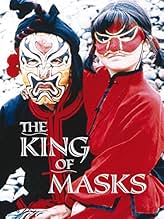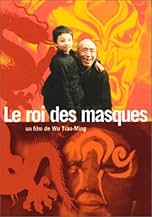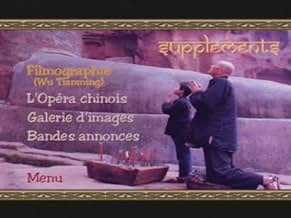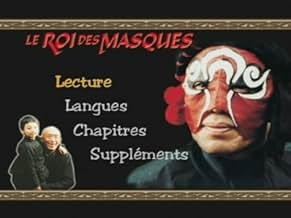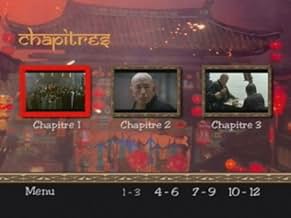IMDb RATING
7.7/10
3.6K
YOUR RATING
In a remote area of China, in the 1930s, a street performer named Wang practices the change-mask opera art of bian lian. Seeking to pass his art, Wang buys what he believes to be an orphan b... Read allIn a remote area of China, in the 1930s, a street performer named Wang practices the change-mask opera art of bian lian. Seeking to pass his art, Wang buys what he believes to be an orphan boy, but quickly learns his new disciple's secret.In a remote area of China, in the 1930s, a street performer named Wang practices the change-mask opera art of bian lian. Seeking to pass his art, Wang buys what he believes to be an orphan boy, but quickly learns his new disciple's secret.
- Awards
- 21 wins & 5 nominations total
- Director
- Writers
- All cast & crew
- Production, box office & more at IMDbPro
7.73.5K
1
2
3
4
5
6
7
8
9
10
Featured reviews
The best Chinese movie I've seen
It was a delightful surprise! This movie does not have Gong Li as a lead actress, but it has the quality that beats any other Chinese movies I've seen. I watched 3 Chinese films yesterday: "Crouching Tigers, Hidden Dragons", "The Emporor and the Assasin" and "King of the Masks (Bian Lian)". Despite of the high profiles of the other two, "King of the Masks" is the only one that left tremendous impression on me. It is a beautiful, touching film. Well done.
A Beautiful Film
This is a beautiful, rich, and very well-executed film with a rich and meaningful story. Basically, it tells how an old master story teller needs to find a (male) heir to carry on his craft, but ends up not getting what he expected in his very male-dominated world. The characters must then deal with their situation and the old master must grapple with the conflict between his desire for a companion and heir and his and society's traditional notions.
The story is fun, emotional, and complex. The exploration of the characters, their lives, and emotions, is rich and compelling the character development is strong while the characters are complex and not one dimensional at all. The film expertly conveys the old man's emotions and his desire to find an heir, and compellingly shows how he and the kid handle the situation. There is also humour, sometimes quite subtle, at appropriate points. The film also examines the good and bad of traditional Chinese culture, creating further interest and depth to the film.
The directing, acting, and scenery are all outstanding. Added to the other strengths, this creates rich and convincing visual images and compelling, real characters. As a result, the film evokes strong empathy for, and feelings about, the characters.
Some have claimed that the ending weakens the film, but I do not necessarily agree. Perhaps it could have been stronger with a different ending, but any improvement in the overall film would have been rather small.
The story is fun, emotional, and complex. The exploration of the characters, their lives, and emotions, is rich and compelling the character development is strong while the characters are complex and not one dimensional at all. The film expertly conveys the old man's emotions and his desire to find an heir, and compellingly shows how he and the kid handle the situation. There is also humour, sometimes quite subtle, at appropriate points. The film also examines the good and bad of traditional Chinese culture, creating further interest and depth to the film.
The directing, acting, and scenery are all outstanding. Added to the other strengths, this creates rich and convincing visual images and compelling, real characters. As a result, the film evokes strong empathy for, and feelings about, the characters.
Some have claimed that the ending weakens the film, but I do not necessarily agree. Perhaps it could have been stronger with a different ending, but any improvement in the overall film would have been rather small.
Life's changing face.
The theme of this film is tradition, which can be a good thing when it preserves continuity across generational lines, but harsh and restrictive when it allows no room for growth. Ironically, the skill of the "grandpa" is in surprising his audience with masks that are ever changing, yet change is the one thing he finds hardest to do. Tradition requires that his skills can only be passed down to a male heir, and hence he would sooner allow his skills to be lost than to break with that tradition. The message he ultimately has to learn is that tradition can sometimes be wrong, and that even he can be surprised by the unexpected mask.
This is a Chinese film, in which we are given the Chinese perspective, but the message is universal. On another level, consider the Christian perspective. Metaphorically speaking, what if Jesus came back wearing the mask of a little girl? Would that representation be rejected on the grounds that it wasn't what they were expecting? Would they reject the mask, and thus miss the message? Or consider the Aztecs of Mexico, who fell victim to the Conquistadors, because Cortez resembled what they thought was the return of their god Quetzalcoatl? Beliefs about traditions can not only be wrong, but potentially enslaving. When we become so blinded by tradition that we can see no room for change, change may have no room for us!
This is a marvelous film, which begs to be compared with "Whale Rider" (2002), having a similar theme but presented from the perspective of a New Zealand Maori tribe. They, too, had a tradition in which the mask of the leader could only be worn by a male, and when a male could not be found, would sooner the tradition die than change. The point of these stories, of course, is not the girl, but the change. There is more to value than gender. When tradition can only accept the one, it might be surprised by the other.
This is a Chinese film, in which we are given the Chinese perspective, but the message is universal. On another level, consider the Christian perspective. Metaphorically speaking, what if Jesus came back wearing the mask of a little girl? Would that representation be rejected on the grounds that it wasn't what they were expecting? Would they reject the mask, and thus miss the message? Or consider the Aztecs of Mexico, who fell victim to the Conquistadors, because Cortez resembled what they thought was the return of their god Quetzalcoatl? Beliefs about traditions can not only be wrong, but potentially enslaving. When we become so blinded by tradition that we can see no room for change, change may have no room for us!
This is a marvelous film, which begs to be compared with "Whale Rider" (2002), having a similar theme but presented from the perspective of a New Zealand Maori tribe. They, too, had a tradition in which the mask of the leader could only be worn by a male, and when a male could not be found, would sooner the tradition die than change. The point of these stories, of course, is not the girl, but the change. There is more to value than gender. When tradition can only accept the one, it might be surprised by the other.
10N6APV
A beautiful movie that is criminally misrated. It is
The movie is truly poignant, unique and uplifting. The story is universal in that it's a battle between good, evil and the world between. THE MOST IMPORTANT thing is that its rating is wrong, misleading, and a travesty. Blockbuster has it rated as though it were an X rated movie. The truth is is that it is closer to G than PG and should be seen by children who can read the clear and simple sub-titles.
10pyotr-3
Wildest thing I've ever seen!
This spectacular film is one of the most amazing movies I have ever seen. It shows a China I had never seen or imagined, and I believe it shows 1930's China in the most REAL light ever seen in a movie. It is absolutely heart-breaking in so many situations, seeing how hard life was for the characters, and yet the story and the ending are incredibly joyful. You truly see the depths and heigths of human existence in this film. The actors are all perfect, such that you feel like you have really entered a different world.
I simply can not recommend this movie highly enough. It may just change you forever once you have seen it.
I simply can not recommend this movie highly enough. It may just change you forever once you have seen it.
Did you know
- GoofsWhen Wang (The Mask King) is performing for the soldiers who insist on having his secret, his missing front tooth is there in one scene, then gone in the next.
- Alternate versionsOriginal Chinese version runs 101 minutes; international Version runs 91 minutes.
- How long is The King of Masks?Powered by Alexa
Details
Box office
- Gross US & Canada
- $1,113,103
- Gross worldwide
- $1,113,103
Contribute to this page
Suggest an edit or add missing content


